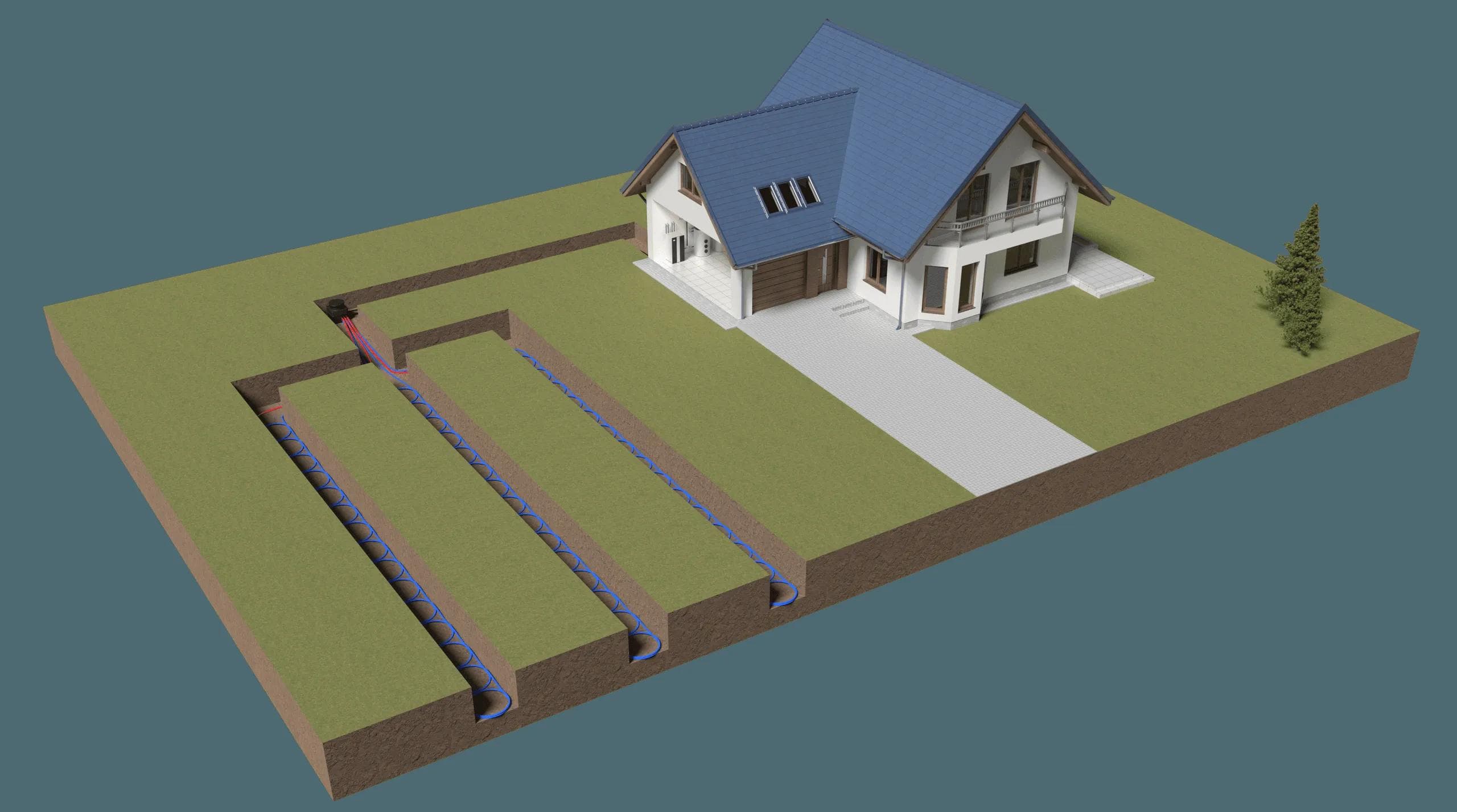Stonewater Housing, Weobley
- LocationHerefordshire
- Completion DateNov 2017
Burton Gardens is situated just a short walk from the centre of the picturesque rural village of Weobley, part of the famous ‘Black and White Village Trail’. This Kensa ground source heat pump retrofit project is the first undertaken by Stonewater Housing, with the aim of providing residents with a warmer and cheaper home heating system that will save them hundreds of pounds annually on their energy bills.
The scheme involved the retrofit of Kensa  What is a Ground Source Heat Pump?Ground Source Heat Pumpsground source heat pumps to 49 sheltered bungalows owned by Stonewater Housing.
What is a Ground Source Heat Pump?Ground Source Heat Pumpsground source heat pumps to 49 sheltered bungalows owned by Stonewater Housing.
It featured Kensa’s innovative system architecture, consisting of an ambient temperature ground loop shared between each pair of properties, comprising a borehole drilled to a depth of circa 150m, which splits via a manifold to serve the individual properties meeting the Ofgem definition of district heating.
Each property contains an individual Kensa  ShoeboxProductShoebox ground source heat pump, meaning all heating and hot water is delivered and more importantly billed at the point of use. This removes the need for individual metering and the administration and management cost of managing a traditional district heating scheme. This also allows the resident to shop around for the cheapest electricity bill to ensure running costs for the system are minimised.
ShoeboxProductShoebox ground source heat pump, meaning all heating and hot water is delivered and more importantly billed at the point of use. This removes the need for individual metering and the administration and management cost of managing a traditional district heating scheme. This also allows the resident to shop around for the cheapest electricity bill to ensure running costs for the system are minimised.
Using the ambient ground loop distribution system no central plant room or energy centre is required, removing the need to provide an additional building to accommodate a plant room, also removing the need for any planning permission for the installations.
There is no need for a central pumping station, as the individual circulating pumps in each unit will provide the necessary flow rate in all operating conditions, this also allows the ground side flow rate to modulate perfectly to the load without the need for any external complex controls.
Each individual property contains a 6kW Shoebox ground source heat pump, with a conventional vented hot water cylinder mounted above, so the total installation fits within the existing cylinder cupboard within the property. The unit is small enough to comfortably fit within existing cupboards and quiet enough to ensure the resident does not encounter any disruption.
Each pair of properties is served by a 150m deep borehole, sized to the energy requirement of the Shoebox ground source heat pumps connected to it. The pipework is 40mm HDPE, which then runs from the top of the borehole at a depth of 1.2m back to the building. As the loop is operating at ambient temperatures, circa 4-8°C, there are no distribution losses and there is therefore no need for expensive pre-insulated pipework. At each property, a manifold is provided splitting flow to the individual Kensa Shoebox ground source heat pumps within each property. Within the property 28mm pipework is used to connect to the ground side of the heat pump, this pipework is lagged and vapour barrier wrapped to prevent condensation.
As the loop operates at ambient temperatures, there are no system distribution losses, there are also no billing or administration charges for the system so running costs to the residents are maximised. Compared to the original Night Storage Heater system, the heat pumps are projected to provide savings of 30-50%, £280-£380 per year, a significant saving for residents living in fuel poverty.
The installation also provides a significant carbon saving with a lifetime saving across the scheme of 5821tCO2; this equates to an average EPC improvement of 19 points on energy efficiency increase to 72 C and a massive 58 point improvement on Environmental Impact, with an average 93 B rating on post-completion EPC’s.
Stonewater’s ground source heat pump upgrade in Burton Gardens is costing the housing organisation £700,000 to install. The scheme, which is being subsidised by an upfront ECO grant of £95,000, has an expected payback of 16 years with Stonewater receiving an additional £800,0000 income over 20 years from the Government’s non-domestic RHI scheme (this scheme has closed).
Additionally, Stonewater will benefit from significant lifetime cost savings and tenants will benefit from improved health; with homes now fully heated, building repair costs and health risks associated with condensation and mold will be significantly reduced.
The long lifetime of the heat pump ensures lifetime cost of ownership is low with the ambient loop infrastructure design to provide three-quarters of the energy needs for the building, for free, for 100 years.
Nick Harris, Stonewater’s Chief Executive, says:
With rising energy costs forcing more vulnerable people into fuel poverty as we approach winter this year, there is a real need for social landlords and housing providers to help tackle the problem which affects thousands of people across the UK. Effective measures such as replacing night storage heaters with more efficient, affordable and carbon-friendly home-heating technologies, can make a big difference to people’s lives, particularly their health and well-being.
An average two-bedroom bungalow typically costs £800 a year to heat with night storage heaters, compared with £390 from a ground source heat pump which is less than half the cost. Our Burton Gardens residents will see a significant reduction in their energy bills with their new ground source heat pump system, which will enable them to heat their homes at an affordable cost and stay warm and comfortable during the cold winter months.
Leon Storer, Stonewater’s Assistant Director of Assets (West), says:
This is a win-win situation. Not only do our residents benefit from significantly reduced bills, more controllable heating and improved health and well-being, CO2 emissions are halved and Stonewater gains an income from ECO funding plus 20 year RHI (this scheme has closed) to off-set its initial investment – a no brainer..!
I am 100% positive that this initial project will be a complete success enabling further investment across similar off gas-grid Stonewater stock.
This has been a fantastic start for Stonewater on this journey for further renewable heat projects, one that I’m keen to continue working in partnership with Kensa.
Scott Baxendale, Stonewater’s Executive Director of Assets, says:
As a responsible housing provider, we have been looking for new and sustainable ways to help provide our residents located off the gas grid with access to cheaper and more efficient home heating. We are delighted with how well this pilot scheme has gone and are now looking forward to introducing it in other viable Stonewater housing communities across the country.
District ground source heat pump systems in rural applications provide significant benefits to all stakeholders, but primarily the running cost savings, increase in control of the heating system, and health benefits of being able to affordably heat the whole home make a real difference to the lives of the residents. Schemes of this nature pave the way for the low carbon future of energy.
The installations have already received 100% positive impact from those involved in the scheme who are now enjoying the comfort of controllable central heating in their homes. The installation process was managed to minimise the disruption to residents with all installation work completed with the residents in situ, with the full heat pump and wet system installation completed in two days per property.
Stonewater expects that district GSHP will eventually become the norm rather than the exception. This project demonstrates the scalable nature of GSHP and provides a blueprint for other housing associations to transform their properties and the lives of their residents.
David Broom, Kensa's Technical Sales Manager comments:
For every ground source heat pump installed at Burton Gardens we are taking the equivalent carbon emissions from two cars off the road. Add to this energy security and affordability becoming an increasingly important issue, it is vital to work with forward-thinking housing providers like Stonewater, to improve the condition of the UK’s housing stock. Through the borehole installations we are providing an infrastructure which will deliver 75% of the heat required for these properties, for free, for the next 100 years. The homes will be warmer and more comfortable for residents as the cost of heating is significantly reduced, plus they are also protected from future cost increases as the majority of the energy required comes from underneath their garden.